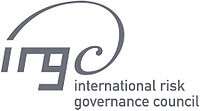International Risk Governance Council
 | |
| Founded | Geneva, Switzerland (2003) |
|---|---|
| Type | Nonprofit organization |
| Focus |
Risk governance Risk management Regulations |
| Headquarters | Lausanne, Switzerland |
Area served | Worldwide |
Key people |
Philippe Gillet (Chairman) Marie-Valentine Florin (Managing Director) |
| Website |
www |
The International Risk Governance Council (IRGC) is an independent non-profit organisation, based at École Polytechnique Fédérale de Lausanne (EPFL) in Lausanne, Switzerland. IRGC works to improve the understanding, management and governance of emerging systemic risks that may have significant adverse consequences for human health and the environment, the economy and society.[1]
IRGC’s activities include developing concepts of risk governance, improving the understanding of major emerging risk issues, and providing risk governance policy recommendations for stakeholders and decision-makers.[2]
History
Amid a number of risk management and regulatory failures in the late 1990s, several academics proposed to the Swiss State Secretariat for Education and Research to create an International Risk Governance Council. IRGC was established by the Swiss Federal Assembly as an independent and international body to bridge increasing gaps between science, technological development, decision-makers and the public.[3]
In June 2003, IRGC was formally founded in Geneva as a private foundation, with Prof. José Mariano Gago as first chairman of the Foundation Board, Prof. Granger Morgan as first chairman of the Scientific and Technical Council and Prof. Wolfgang Kröger as founding director.[4]
In June 2012, the IRGC Secretariat moved its offices from Geneva to the Ecole Polytechnique Federale de Lausanne (EPFL) in Lausanne, Switzerland. IRGC signed a formal collaboration agreement with EPFL that came into effect on January 1, 2013, according to which EPFL will support IRGC’s mission and activities.[5]
In July 2012, IRGC was granted special consultative status with the United Nations Economic and Social Council (ECOSOC)[6] and in July 2014, became a member of the Sustainable Development Solutions Network (SDSN).[7]
Organisation and Funding
IRGC is characterised by a decentralised network structure of public, private and scientific institutions involved in risk management and risk governance.[2]
IRGC is governed by its Foundation Board (List of current members) and guided by a Scientific and Technical Council (List of current members) and an Advisory Committee (List of current members).
As a non-profit organisation, IRGC receives funding from both public and private sources. IRGC’s sponsors and partners have included, among others:[8]
- Swiss State Secretariat for Education and Research (Switzerland);
- École Polytechnique Fédérale de Lausanne, Lausanne (Switzerland);
- Swiss Re (Switzerland);
- Oliver Wyman (USA);
- Center for Strategic Futures (Singapore)
- Treasury Board Secretariat (Canada);
IRGC also benefits from numerous in-kind contributions, in particular from members of its academic network (List of academic partners)
Activities
IRGC's activities focus on emerging risk issues, slow-developing catastrophic risks, risk governance deficits, and the fostering of risk governance cultures worldwide.
IRGC has been active in the areas of nanotechnology, unconventional gas development, carbon capture and storage, solar radiation management, energy transition, critical infrastructures, and bio-energy.[9]
IRGC has developed the Risk Governance Framework, whose stated purpose is "to help policy-makers and regulators both understand the concept of risk governance and apply it to their handling of risks."[10] The Framework has been used and discussed in many institutions and organisations, including the European Food Safety Authority,[11] the Health Council of the Netherlands,[12] the UK Treasury,[13] the US Environmental Protection Agency,[14] and other private and public organisations.
See also
References
- ↑ Mission and Purpose IRGC. Retrieved 10 April 2015
- 1 2 Den Umgang mit Risiken üben Neue Zürcher Zeitung. Retrieved 24 April 2015.
- ↑ Botschaft über die Förderung von Bildung, Forschung und Technologie in den Jahren 2004–2007. Federal Gazette (2003). Retrieved 06 August 2014.
- ↑ Eidgenössisches Departement des Innern. Retrieved 06 August 2014
- ↑ History IRGC. Retrieved 10 April 2015
- ↑ List of non-governmental organizations in consultative status with the Economic and Social Council as of 1 September 2013. United Nations Economic and Social Council. Retrieved 06 August 2014.
- ↑ SDSN Welcomes New Members. Sustainable Development Solutions Network. Retrieved 06 August 2014.
- ↑ Investing in IRGC. IRGC. Retrieved 10 April 2015
- ↑ http://www.irgc.org/issues/ Issues. IRGC. Retrieved 25 April 2015.
- ↑ IRGC (2008) An Introduction to the IRGC Risk Governance Framework, quote in Preface. Document available at www.irgc.org. Retrieved 10 April 2015.
- ↑ Dreyer, M. and Renn, O. (eds) (2009) Food Safety Governance: Integrating Science, Precaution and Public Involvement (Heidelberg and New York, Springer)
- ↑ Health Council of the Netherlands (2006) Health Significance of Nanotechnologies, (The Hague: Health Council of the Netherlands: publication no. 2006/06E
- ↑ UK Treasury Department (2005) “Managing Risks to the Public: Appraisal Guidance”, Draft for Consultation, HM Treasury Press, London
- ↑ US EPA (2009) Potential Nano-enabled Environmental Applications for Radionuclides. EPA-402-R-06-002, Washington: EPA.